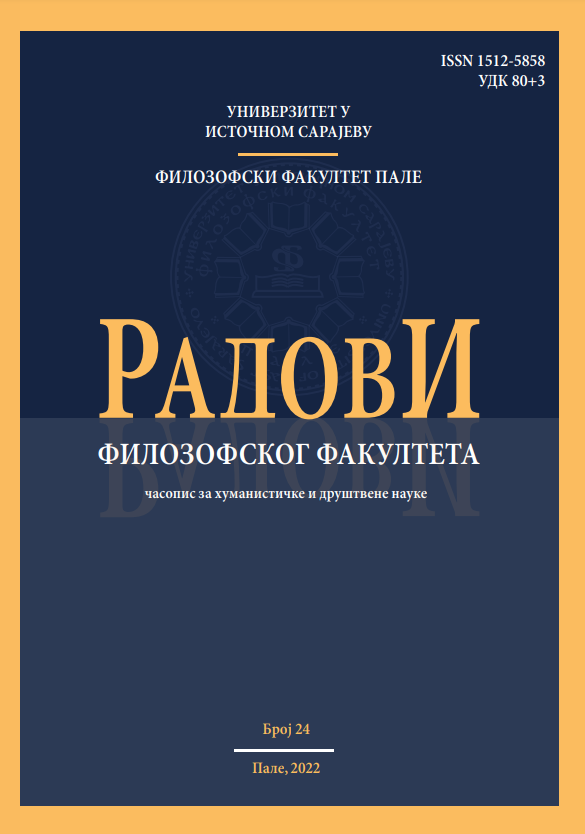ЛИРСКО ТКАЊЕ РОМАНА НЕБО, ТАКО ДУБОКО ВЕСНЕ КАПОР
LYRICAL WEAVING IN THE NOVEL THE SKY, SO DEEP BY VESNA KAPOR
Author(s): Milica M. KecojevićSubject(s): Studies of Literature, Serbian Literature
Published by: Универзитет у Источном Сарајеву, Филозофски факултет Пале
Keywords: Vesna Kapor; lyrical novel; polyphonic narrative; intertextuality; love; ephemerality; death; sky; semantics of seasons; symbolics of colours;
Summary/Abstract: This paper analyses the latest, fifth book by contemporary author Vesna Kapor − The Sky, So Deep [Nebo, tako duboko] (2021). We first analysed the morphological features of the novel (which vacillates between shorter and longer narrative form, has a mosaic-based composition, is divided into three units uneven in length, has a fragmentary nature…), highlighted a number of specific procedures (e.g. rhythmic organisation of the narrative, symbolisation of the text, different forms of citations, the most frequent being the so-called self-citations (literal repetitions of own sentences) and interliterary citations (Miloš Crnjanski, Ivan V. Lalić, Miodrag Pavlović, Vladislav Petković Dis) and the stylistic-expressive means, typical of poetry (such as metaphor, personification, comparison, contrast). Given the conclusions we reached, we determined that the novel The Sky, So Deep belongs primarily to the lyrical novel genre, an essentially paradoxical phenomenon defined by the American literary theorist Ralph Freedman. Our thesis about the lyrical nature of this novel is corroborated not only by the high degree of emotiveness and illustrative, suggestive descriptions and superb comparisons, but also by the phenomenon of smells and sounds. However, one should also not disregard the omnipresence of colours (blue, white, red and green) and the importance of their symbolism, which can be interpreted as the author’s debt to expressionistic heritage.We also highlighted that the title The Sky, So Deep already suggests that the key focus of the novel is on the sky, i.e. the absolute, paving the way for a metaphysical meaning, but also on fathoming the depths of human existence. Moreover, the novel is not only dedicated to a girl with a symbolic name and surname – Tara Senica (Tara – name of a mountain; Senica – chickadee), but is also in its subtitle designated as “Letters for Tara”. Tara thus has the function of an addressee, i.e., the recipient of letters/messages, sent to her by addressers/senders, mother Mira, father Deki, an unnamed young man with whom she maintained a harmonious love relationship for some time, and the unnamed female narrator, who is an important part of the fictional world and actively participates in it, first in the role of a careful listener to the confessions of Tara’s mother, and later as the person writing down the memories that Mira, during numerous meetings, revived, choosing particularly the most important, emotional and moving content. In place is a polyphony of sorts, a dynamic shift of the expressed and unexpressed words, thoughts and feelings. As Tara is no longer among the living, this novel has the role of an ancient, almost mythic dialogue with a deceased, dear and close person. Tara’s voice can be added to the above voices as the messages, greetings, postcards and diary entries written by her hand during her life are introduced into the reader’s horizon. Whatsoever, the very first micro-unit, the only one consistently rendered in the first person, is a note taken from Tara’s notebook, i.e., a speech she prepared for a Serbian language class. The central, most extensive part elaborates on the agony that Tara’s parents experienced over a fourteen-day period, from the moment Tara got ill until she left this world. In addition, several fragments are devoted to memories of the days preceding Tara’s birth, while an incomparably larger number of fragments evoke the memories of the events and situations in which Tara’s closest ones participated after her sudden and tragic death. Unlike Tara’s dearest, particularly her inconsolable mother, the narrator of the novel The Sky, So Deep truly believes in the concept of the eternally recurring life, and her conviction is further supported by the shift of the seasons, the arrival of summer and ripening of a watermelon, which, red and succulent, becomes a clear signal that “life does not end”. With her latest book, Vesna Kapor has managed to delineate an entire process of such a flow.
Journal: Радови Филозофског факултета (часопис за хуманистичке и друштвене науке)
- Issue Year: 2022
- Issue No: 24
- Page Range: 101-118
- Page Count: 18
- Language: Serbian

